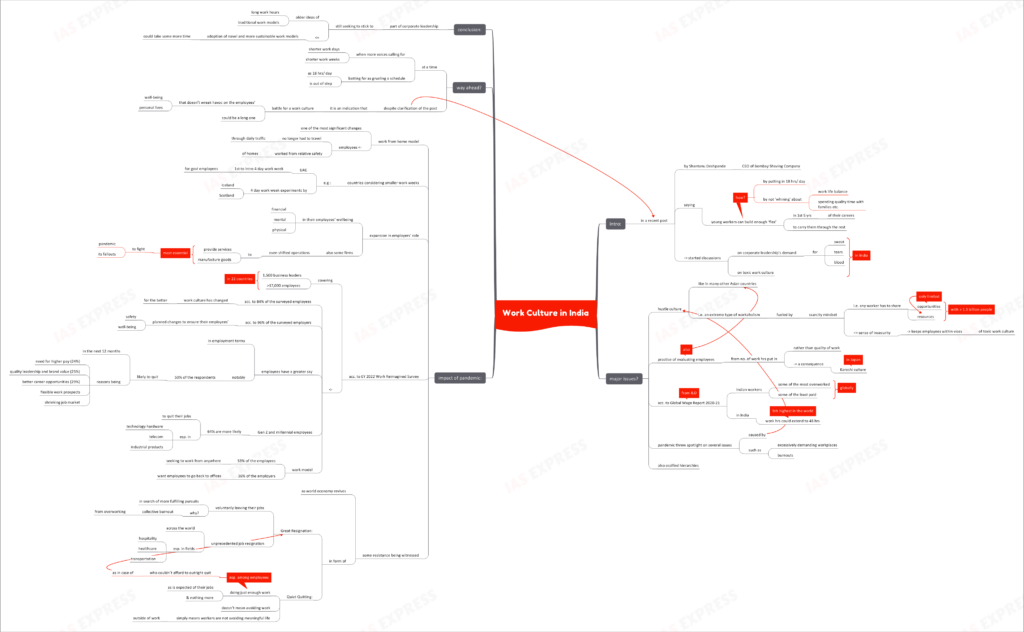Work Culture in India

From Current Affairs Notes for UPSC » Editorials & In-depths » This topic
IAS EXPRESS Vs UPSC Prelims 2024: 85+ questions reflected
In a recent post, Shantanu Deshpande, the CEO of Bombay Shaving Company, said that young workers can build enough ‘flex’ in their career’s 1st 5 years to carry them through the rest, by putting in 18 hours/ day and exhorted youngsters to not whine about issues like work-life balance and spending quality time with family. This has opened discussions on corporate leadership’s demand for sweat, tears and blood and the toxic work culture prevailing in India.

What are the major issues in Indian work culture?
- The Indian workplace, like in case of many other Asian workplaces, still sees the prevalence of the ‘hustle culture’– a type of extreme workaholism.
- This culture is fuelled by the scarcity mindset i.e. any worker has to share opportunities and resources with over 1.3 billion other people and there is only so much to go around. This leads to a feeling of insecurity which keeps the employees within the vices of toxic work culture.
- The practice of evaluating an employee from the number of hours put in by him/ her, rather than the quality of his/ her work is prevalent not only in India, but across Asian countries. The Karoshi culture of Japan illustrates the consequence of this cultural idea.
- The Global Wage Report 2020-21, from the ILO, notes that Indians have some of the longest work hours and are among the least paid globally. The working hours could extend up to 48 hours, putting India at the 5th spot among countries with the longest working hours.
- The recent pandemic threw the spotlight on a number of issues brought in by this hustle culture- such as excessively demanding workplaces and burnouts among the employees.
- In addition to this, the Indian workplace suffers from ossified hierarchies.
How did the pandemic change work culture?
- One of the most significant changes brought in by the pandemic lockdowns is the work from home model. Employees no longer had to commute the daily traffic to get to workplaces and worked from the relative safety of their homes.
- Countries have started considering smaller work-weeks. For instance, UAE became the 1st country to implement a 4 day work-week for its government employees. Scotland and Iceland are also experimenting with smaller work-weeks.
- The pandemic has seen an expansion in employers’ role in their employees’ wellbeing- be it financial, mental or physical well-being. Some firms even started shifting operations to providing services or manufacturing goods most essential to combat the pandemic and its fallouts.
- The EY 2022 Work Reimagined Survey, which covered 1,500 business leaders and over 17,000 employees in 22 countries, noted the following:
- Some 84% of the surveyed employees opine that the work culture has changed for the better.
- 96% of the surveyed employers have planned changes to ensure their employees’ safety and well-being.
- Now, employees have a greater say in employment terms. Over 50% of the respondents said they were likely to quit in the next 12 months, the reasons being the need for higher pay (24%), quality leadership and brand value (25%), better career opportunities (29%), flexible work prospects and a shrinking job market.
- The survey found that Gen Z and millennial employees (64%) are more likely to quit their jobs. This is especially so in technology hardware, telecom and industrial products sectors.
- However, while 53% of the employees wanted to be able to work from anywhere, 36% of the employers wanted employees to go back to offices.
- As the world economy gets back up, subtle resistance is being witnessed in the form of several trends like:
Great Resignation:
- Many are voluntarily leaving their jobs in search of more fulfilling pursuits.
- The collective burnout from overworking led to unprecedented rate of job resignation across the world.
- This trend was especially evident in hospitality, healthcare and transportation sectors.
Quiet Quitting:
- Many employees are doing just enough work as is expected of their jobs and nothing more. This trend is more visible among employees who couldn’t afford to outright quit their jobs.
- This doesn’t mean avoiding work, it simply means workers are not avoiding meaningful life outside of work.
What is the way ahead?
- At a time when more and more voices are calling for shorter work days and work weeks, batting for as gruelling a schedule as 18 hours/ day is out of step.
- Though Mr Deshpande clarified that he didn’t mean 18 hours/ day literally, after massive outrage on social media, the original post is an indication that the battle for a work culture that doesn’t wreak havoc on the employees’ well-being and personal lives could be a long one.
Conclusion:
The fact that a part of corporate leadership still seek to stick to the older ideas of long work hours and traditional work models, could mean that the adoption of novel and more sustainable work models could take some more time.
Practice Question for Mains:
What are the major issues plaguing the Indian work culture? How has the pandemic changed things? (250 words)
If you like this post, please share your feedback in the comments section below so that we will upload more posts like this.

